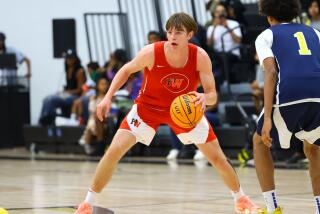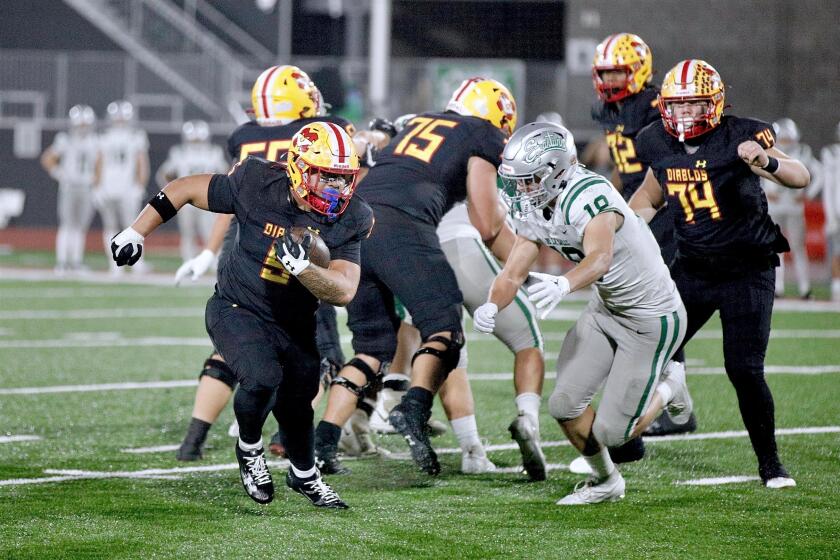Pruitts Learned Off-Court Lessons Too Late
On the eve of the Southern Regional boys’ basketball finals, standout Westchester guard Gabriel Pruitt and his father, George, sat side by side in their South Los Angeles home for 50 minutes and reflected on lessons learned as participants in the sometimes chaotic world of high school basketball.
It’s a cautionary tale about putting too much trust in the opinion of others. It’s a warning about teenagers becoming pawns in an escalating competition among high schools to be No. 1. It’s a story of what happens when a decision to transfer goes awry.
By all accounts, the 6-foot-4 Pruitt is the best basketball player in California not to have participated in the playoffs. Westchester, the state’s No. 1-ranked team during the regular season and a two-time reigning state champion in Division I, was banned from postseason competition because of an alleged recruiting violation involving transfer Amir Johnson.
Adding to Pruitt’s turmoil, he sat out last season -- 35 games -- because the City Section ruled he had submitted a false address when he transferred from Compton Centennial to Westchester.
“I couldn’t believe high school basketball would be this intense,” Pruitt said. “I realize that parents and outside [people] get too involved. I would say the adults have taken the fun away by being so involved.”
His father has taken full responsibility for the transfer debacle.
“I’m mad at myself,” he said.
George Pruitt knew little about travel teams, club coaches and the all-out competition among high schools to discover top players who might want to attend their powerhouse school. Then Gabriel started attracting attention when he was 10 years old.
“You meet a lot of people,” George said. “They’re selling their programs all the time. I listened to people I shouldn’t have. Everybody is nice, but that’s the nature of the business. You find yourself trying to look into people’s hearts and not their words.”
George said he used a friend’s home address when Gabriel first enrolled at Centennial as a freshman. It was a time when he was thinking of moving his family to Compton but never did.
The family was pleased with the Centennial coaches and team, but George decided he wanted Gabriel closer to home after two years of 5:30 a.m. bus rides. He lived in the Manual Arts attendance area and obtained an opportunity transfer to Westchester, which was five minutes from where he worked for a car rental agency.
“You love your son and care about your son and want to have him in the best situation possible,” George said. “I live in South Central, and the schools seem to have very little resources. My kids go to schools where they don’t have books. They make Xerox copies.”
The City Section asked George at a hearing if he had moved. Once he answered, “No,” Gabriel’s fate was decided. His home address was not the same as the Centennial address. Gabriel was banished to the sideline.
“I received some advice that wasn’t good advice,” George said. “Gabriel had no idea what was going on.”
The family accepted the punishment and didn’t appeal. Gabriel worked out with a private coach last season. The most frustrating moment came when he had to sit at home and watch on TV while his teammates played against LeBron James.
Sitting out a season didn’t harm Gabriel’s college hopes. USC signed him last November. This season, he averaged 22 points. He proved his ability against top competition, scoring 31 points against the No. 1 team in the nation, Mouth of Wilson (Va.) Oak Hill, and helped the Comets beat City champion Woodland Hills Taft and City runner-up Los Angeles Fairfax twice. He would have been a City player-of-the-year candidate if the Comets were playoff eligible.
But when the state CIF refused to overturn Westchester’s postseason ban only hours before the City playoffs began last month, Gabriel’s high school career came to an abrupt end.
Having already endured a season of no basketball, Gabriel was the ideal person to offer words of encouragement to Johnson, a 6-9 center who led L.A. Verbum Dei to a section title last year as a sophomore but ended up playing only four games this season.
“I told him not to worry,” Gabriel said. “You have no control. You can’t sulk. You have to use [the time of ineligibility] to your advantage and improve your game so you’ll be ready next season.”
Through adversity, Gabriel learned to trust his instincts and discovered that a good player doesn’t need to transfer to get noticed by college recruiters.
“I didn’t believe it at first, but I realized if you’re good, they’ll find you,” he said. “It didn’t matter where I played.”
George said the lessons he learned were “follow the rules, make your own decisions, do what you think is right every step of the way.”
Another son, 14-year-old Jason, is a promising eighth-grade basketball player. Two daughters, 11 and 13, also play basketball. This time, after they choose a school, George insisted they’ll be staying for four years.
“I’m learning from my mistakes,” he said.
As for Gabriel, he’s scheduled to play in several national all-star games. At least twice a week, he receives tutoring in preparation for taking the SAT on March 27. There’s no doubt he has the talent and ability to one day become an NCAA All-American and perhaps play in the NBA.
He offers this advice: “You only get this opportunity once to play in high school, and do whatever it takes to have a good experience.”
*
Eric Sondheimer can be reached at [email protected].
More to Read
Get our high school sports newsletter
Prep Rally is devoted to the SoCal high school sports experience, bringing you scores, stories and a behind-the-scenes look at what makes prep sports so popular.
You may occasionally receive promotional content from the Los Angeles Times.







